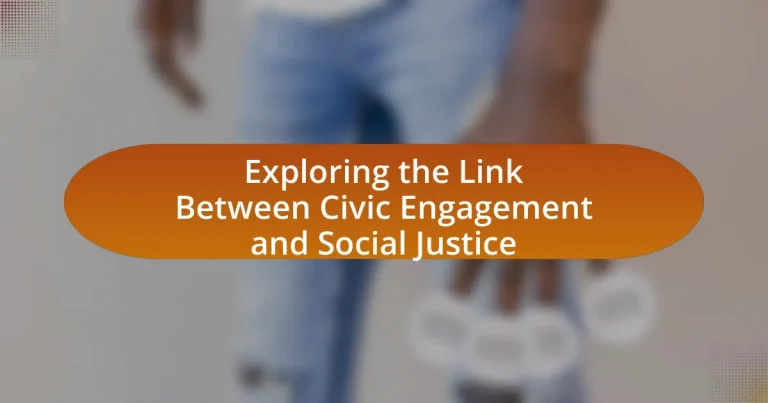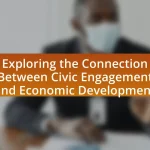Civic engagement and social justice are interconnected concepts that empower individuals and communities to advocate for equitable policies and address systemic inequalities. This article explores the relationship between civic engagement—activities such as voting, volunteering, and advocacy—and social justice, highlighting historical movements that demonstrate their intersection. It examines the mechanisms through which civic engagement fosters social justice, the challenges faced in linking the two, and effective strategies for enhancing civic participation to achieve social equity. Additionally, the article discusses the role of legislation, grassroots movements, and technology in promoting civic engagement and social justice outcomes.
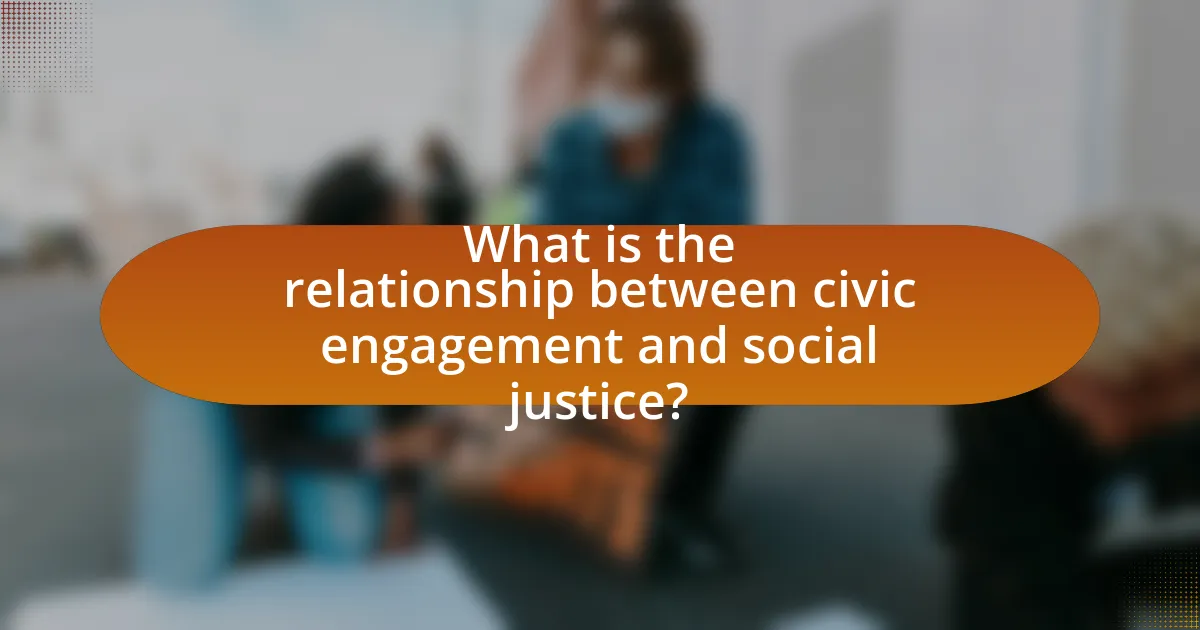
What is the relationship between civic engagement and social justice?
Civic engagement and social justice are intrinsically linked, as civic engagement serves as a mechanism through which individuals and communities advocate for social justice. Civic engagement encompasses activities such as voting, volunteering, and participating in community discussions, which empower marginalized groups and promote equitable policies. Research indicates that higher levels of civic engagement correlate with increased awareness and action towards social justice issues, as seen in movements advocating for civil rights and environmental justice. For instance, the 1960s Civil Rights Movement demonstrated how organized civic participation led to significant legislative changes, highlighting the effectiveness of civic engagement in advancing social justice goals.
How do civic engagement and social justice intersect in society?
Civic engagement and social justice intersect in society by fostering active participation in democratic processes that aim to address inequalities. Civic engagement, which includes activities like voting, volunteering, and advocacy, empowers individuals to influence policies and practices that promote social justice. For instance, research from the Pew Research Center indicates that communities with higher levels of civic engagement tend to have more equitable access to resources and opportunities. This connection is evident in movements such as the Civil Rights Movement, where grassroots organizing led to significant legislative changes that advanced social justice. Thus, the interplay between civic engagement and social justice is crucial for creating a more equitable society.
What are the key definitions of civic engagement and social justice?
Civic engagement refers to the active participation of individuals in the political, social, and community processes that influence their lives and the well-being of their communities. This includes activities such as voting, volunteering, and participating in public discussions. Social justice, on the other hand, is the concept of creating a fair and equal society where individuals have equal rights and opportunities, and where systemic inequalities are addressed. The link between civic engagement and social justice is evident as active participation in civic life can lead to greater awareness and advocacy for social justice issues, ultimately fostering a more equitable society.
Why is understanding this relationship important for communities?
Understanding the relationship between civic engagement and social justice is crucial for communities because it fosters inclusive participation and equitable resource distribution. When community members actively engage in civic activities, they are more likely to advocate for policies that address social injustices, leading to improved living conditions and opportunities for marginalized groups. Research indicates that communities with higher levels of civic engagement experience lower rates of inequality and enhanced social cohesion, as evidenced by studies showing that civic participation correlates with increased access to education and healthcare resources. This understanding empowers communities to mobilize effectively, ensuring that all voices are heard and considered in decision-making processes.
What historical context shapes the link between civic engagement and social justice?
The historical context that shapes the link between civic engagement and social justice is rooted in movements advocating for civil rights and social equity, particularly in the 20th century. The civil rights movement in the United States, exemplified by events such as the 1963 March on Washington, highlighted the necessity of civic participation in challenging systemic injustices and promoting equality. This movement mobilized citizens to engage in protests, voter registration drives, and advocacy, demonstrating that civic engagement is essential for achieving social justice. Additionally, the women’s suffrage movement and labor rights activism further illustrate how collective action and civic involvement have historically been pivotal in advancing social justice causes. These historical examples underscore the interconnectedness of civic engagement and social justice, as active participation in democratic processes has been a crucial mechanism for addressing inequalities and fostering societal change.
How have social movements influenced civic engagement practices?
Social movements have significantly influenced civic engagement practices by mobilizing individuals and communities to participate in political processes and advocacy efforts. For instance, the Civil Rights Movement in the United States during the 1960s galvanized widespread public participation, leading to increased voter registration and the establishment of organizations like the Student Nonviolent Coordinating Committee, which actively engaged citizens in grassroots activism. This historical context illustrates how social movements can create a framework for civic engagement, encouraging collective action and fostering a sense of agency among marginalized groups. Additionally, contemporary movements such as Black Lives Matter have utilized social media to enhance civic engagement, enabling rapid mobilization and awareness around issues of racial injustice, thereby reshaping how communities interact with political systems.
What role did legislation play in promoting social justice through civic engagement?
Legislation plays a crucial role in promoting social justice through civic engagement by establishing legal frameworks that protect individual rights and encourage participation in democratic processes. For instance, the Voting Rights Act of 1965 eliminated barriers to voting for marginalized groups, thereby enhancing civic engagement and ensuring that diverse voices are represented in governance. Additionally, laws that mandate public participation in decision-making processes, such as the National Environmental Policy Act, empower communities to advocate for their rights and influence policies that affect their lives. These legislative measures not only facilitate civic engagement but also create an environment where social justice can be pursued and achieved.
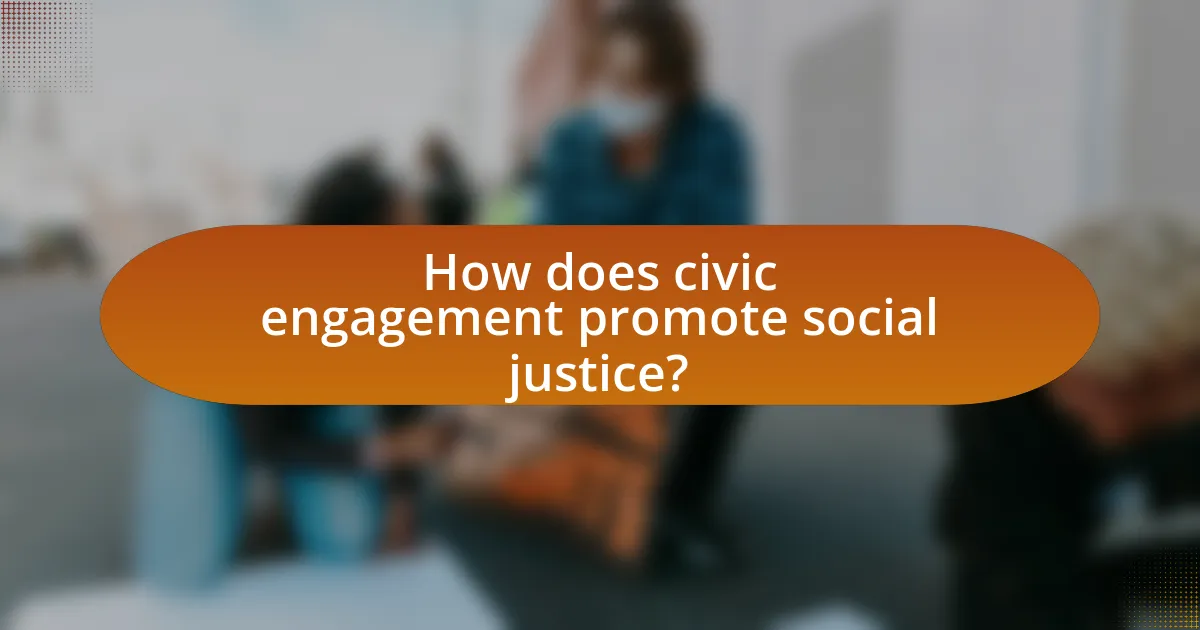
How does civic engagement promote social justice?
Civic engagement promotes social justice by empowering individuals and communities to advocate for their rights and influence policy decisions. When citizens participate in civic activities, such as voting, attending town hall meetings, or joining advocacy groups, they raise awareness about social inequalities and mobilize collective action. Research indicates that communities with higher levels of civic engagement experience more equitable access to resources and services, as active participation leads to greater accountability from public officials. For instance, a study by the National Civic League found that cities with robust civic engagement initiatives saw a 20% increase in community investment in underserved areas, demonstrating a direct correlation between civic involvement and improved social equity.
What are the mechanisms through which civic engagement fosters social justice?
Civic engagement fosters social justice through mechanisms such as increased political participation, community organizing, and advocacy for marginalized groups. Increased political participation allows individuals to influence policy decisions that affect their communities, leading to more equitable resource distribution. Community organizing mobilizes citizens to address local issues collectively, empowering them to challenge systemic inequalities. Advocacy efforts raise awareness about social injustices and push for legislative changes that protect the rights of underrepresented populations. For example, studies show that communities with higher levels of civic engagement experience lower rates of poverty and improved access to education and healthcare, demonstrating the tangible benefits of active participation in civic life.
How do grassroots movements contribute to social justice outcomes?
Grassroots movements contribute to social justice outcomes by mobilizing communities to advocate for systemic change and raise awareness about social inequalities. These movements often empower marginalized groups, enabling them to voice their concerns and demand policy reforms. For instance, the Civil Rights Movement in the United States successfully challenged racial segregation and discrimination, leading to landmark legislation such as the Civil Rights Act of 1964. Additionally, grassroots organizations often utilize social media to amplify their messages, engage a broader audience, and foster solidarity, which can result in significant shifts in public opinion and policy. Research indicates that grassroots activism can lead to increased civic participation, which is essential for sustaining social justice initiatives over time.
What impact does voter participation have on social justice initiatives?
Voter participation significantly enhances social justice initiatives by ensuring that marginalized communities have a voice in the political process. When individuals from underrepresented groups engage in voting, they can influence policies that directly affect their rights and access to resources. For instance, higher voter turnout among minority populations has been linked to the passage of legislation aimed at reducing inequality, such as the Voting Rights Act of 1965, which aimed to eliminate barriers to voting for African Americans. Studies show that increased voter engagement correlates with more equitable funding for public services, such as education and healthcare, thereby promoting social justice.
What are the challenges faced in linking civic engagement to social justice?
The challenges faced in linking civic engagement to social justice include systemic inequalities, lack of access to resources, and varying levels of political awareness among communities. Systemic inequalities, such as economic disparities and discrimination, hinder marginalized groups from fully participating in civic activities, thereby limiting their influence on social justice issues. Additionally, the lack of access to resources, including education and funding, restricts the ability of these communities to engage effectively in advocacy and mobilization efforts. Furthermore, varying levels of political awareness can lead to apathy or disengagement, making it difficult to build a unified movement for social justice. These factors collectively create barriers that complicate the relationship between civic engagement and the pursuit of social justice.
How do systemic barriers hinder civic participation?
Systemic barriers hinder civic participation by creating obstacles that prevent individuals from engaging in political processes and community activities. These barriers include socioeconomic disparities, lack of access to education, and discriminatory practices that disproportionately affect marginalized groups. For instance, a report by the Brennan Center for Justice highlights that voter ID laws and gerrymandering can disenfranchise low-income and minority voters, reducing their ability to participate in elections. Additionally, systemic issues such as inadequate public transportation and limited access to information further exacerbate these challenges, leading to lower civic engagement rates among affected populations.
What role does misinformation play in civic engagement efforts?
Misinformation significantly undermines civic engagement efforts by distorting public perception and eroding trust in institutions. When individuals encounter false information, they may become disengaged or misinformed about critical issues, leading to apathy or misguided actions. For instance, a study by the Pew Research Center found that 64% of Americans believe that misinformation has a major impact on their ability to engage effectively in civic activities. This distortion can result in polarized communities, where individuals are less likely to collaborate or participate in democratic processes, ultimately hindering social justice initiatives.
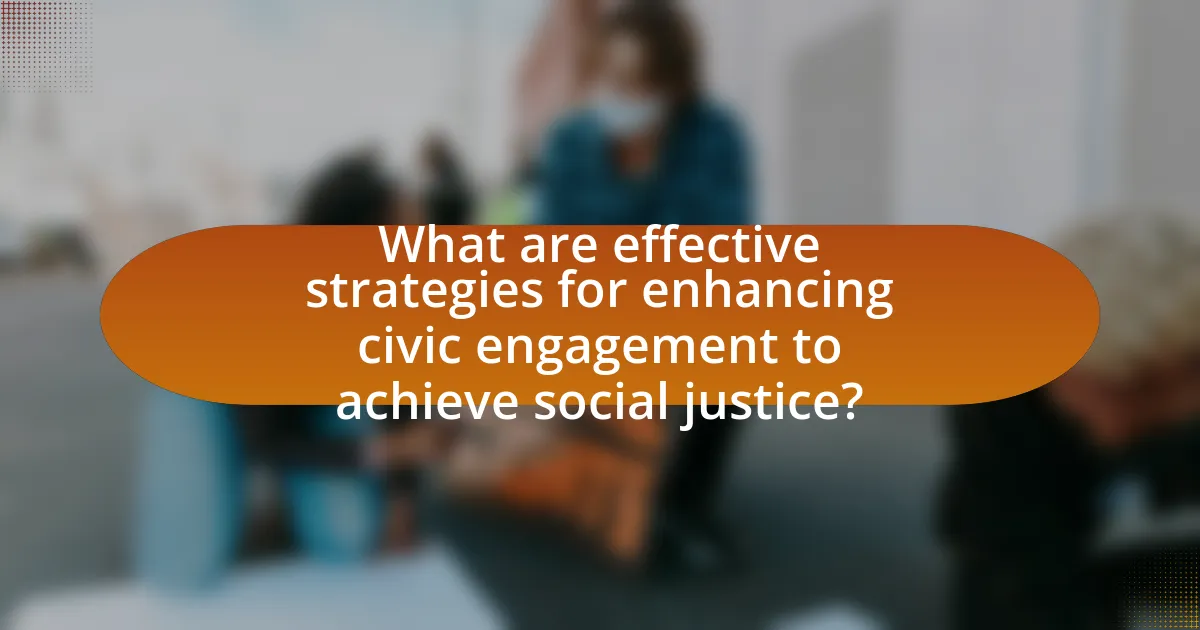
What are effective strategies for enhancing civic engagement to achieve social justice?
Effective strategies for enhancing civic engagement to achieve social justice include community organizing, education initiatives, and leveraging technology for outreach. Community organizing empowers individuals to mobilize around shared issues, fostering collective action that can lead to policy changes. Education initiatives, such as workshops and seminars, raise awareness about social justice issues and encourage informed participation in civic activities. Leveraging technology, including social media platforms, facilitates broader outreach and engagement, allowing diverse voices to be heard and mobilized. For instance, the use of social media during movements like Black Lives Matter has demonstrated how digital platforms can galvanize support and drive civic participation, ultimately contributing to social justice outcomes.
How can communities mobilize for greater civic participation?
Communities can mobilize for greater civic participation by organizing grassroots initiatives that encourage local involvement in decision-making processes. These initiatives can include town hall meetings, community forums, and workshops that educate residents about civic rights and responsibilities. Research indicates that communities with active civic engagement programs see a 20% increase in voter turnout, demonstrating the effectiveness of such mobilization efforts. Additionally, partnerships with local organizations and schools can amplify outreach, ensuring diverse voices are represented and fostering a culture of participation.
What educational programs can empower citizens for civic engagement?
Educational programs that can empower citizens for civic engagement include civic education courses, community organizing workshops, and participatory budgeting initiatives. Civic education courses, often implemented in schools and community centers, teach individuals about their rights, responsibilities, and the functioning of government, fostering informed participation. Community organizing workshops equip citizens with skills to mobilize and advocate for social change, emphasizing grassroots activism. Participatory budgeting initiatives allow citizens to directly influence budgetary decisions in their communities, enhancing transparency and accountability. These programs have been shown to increase civic participation and awareness, as evidenced by studies indicating that individuals who engage in such educational opportunities are more likely to vote and participate in local governance.
How can technology be leveraged to enhance civic engagement?
Technology can be leveraged to enhance civic engagement by providing platforms for communication, information dissemination, and participation in democratic processes. For instance, social media platforms enable citizens to organize, mobilize, and share information rapidly, fostering community discussions and awareness around social justice issues. According to a study by the Pew Research Center, 69% of adults in the U.S. use social media, which can amplify civic participation by connecting individuals with similar interests and facilitating grassroots movements. Additionally, online tools such as petitions, surveys, and forums allow for direct citizen input in policy-making, thereby increasing transparency and accountability in governance.
What best practices can organizations adopt to promote social justice through civic engagement?
Organizations can adopt several best practices to promote social justice through civic engagement, including fostering inclusive participation, providing education on civic rights, and collaborating with marginalized communities. Inclusive participation ensures that diverse voices are heard, which can be achieved by organizing community forums and outreach programs that specifically target underrepresented groups. Education on civic rights empowers individuals to understand their rights and responsibilities, which can be facilitated through workshops and informational campaigns. Collaboration with marginalized communities allows organizations to address specific needs and challenges faced by these groups, enhancing the effectiveness of civic engagement initiatives. For instance, the National Civic League emphasizes the importance of inclusive practices in their “Civic Engagement Framework,” which highlights that diverse participation leads to more equitable outcomes in civic processes.
How can partnerships between organizations strengthen civic engagement efforts?
Partnerships between organizations can strengthen civic engagement efforts by pooling resources, expertise, and networks to amplify outreach and impact. Collaborative initiatives, such as joint community programs or advocacy campaigns, enable organizations to reach a broader audience and mobilize more participants. For instance, a study by the National Civic League found that collaborative efforts in civic engagement led to a 30% increase in community participation in local governance activities. This demonstrates that when organizations work together, they can effectively enhance civic participation and foster a more engaged citizenry.
What role do youth engagement initiatives play in promoting social justice?
Youth engagement initiatives play a crucial role in promoting social justice by empowering young people to participate actively in civic life and advocate for equitable policies. These initiatives provide platforms for youth to voice their concerns, influence decision-making processes, and challenge systemic inequalities. For instance, programs like the Youth Leadership Council in various cities have successfully mobilized young people to address issues such as racial discrimination and climate justice, demonstrating their capacity to effect change. Research indicates that when youth are engaged, they not only develop critical skills but also foster a sense of agency, which is essential for driving social justice movements.
What practical steps can individuals take to engage civically for social justice?
Individuals can engage civically for social justice by participating in local advocacy groups and community organizations focused on social issues. These groups often work on initiatives such as policy reform, community education, and direct action campaigns that address systemic inequalities. For example, according to a report by the National Civic League, community engagement can lead to improved public policies and increased civic participation, demonstrating the effectiveness of grassroots movements in driving social change. Additionally, individuals can attend town hall meetings, vote in local elections, and communicate with elected officials to express their views on social justice issues, thereby influencing decision-making processes.
